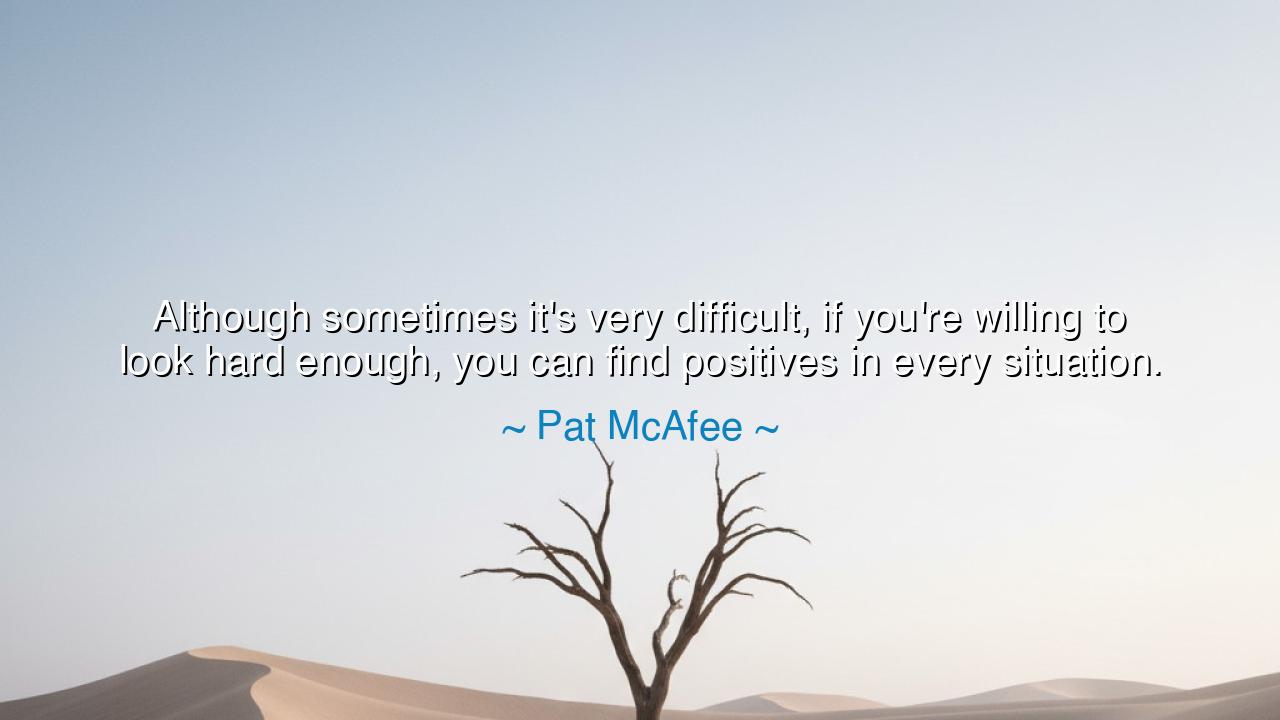
Although sometimes it's very difficult, if you're willing to
Although sometimes it's very difficult, if you're willing to look hard enough, you can find positives in every situation.






The words of Pat McAfee—“Although sometimes it's very difficult, if you're willing to look hard enough, you can find positives in every situation.”—carry the sound of a warrior’s wisdom forged in hardship. They remind us that life is not a path of endless triumph, but one strewn with trial, disappointment, and sudden turns of fate. Yet even within these moments of suffering, if one has the courage to search with patient eyes, there lies a spark of light. This spark is the positive, small though it may be, that transforms despair into endurance and weakness into strength.
The ancients often taught that adversity was not to be feared, but embraced as a hidden teacher. The Stoics declared that nothing in life is wholly evil, for every obstacle is a chance to cultivate virtue. Marcus Aurelius, emperor and philosopher, wrote that misfortune becomes fuel for the flame of the soul, if only one chooses to see it so. McAfee’s words echo this eternal truth: though the search for good in hardship may be very difficult, it is never futile, for life conceals meaning even in its harshest hours.
History bears witness to this principle in countless lives. Consider Helen Keller, struck by illness in early childhood, left without sight or hearing. To many, her life might have seemed swallowed by darkness. Yet with determination, and through the guidance of her teacher Anne Sullivan, she discovered purpose and became a voice for compassion, education, and resilience. The positive in her condition lay not in the suffering itself, but in what she learned to build from it—courage, empathy, and advocacy that continues to inspire the world.
McAfee’s counsel also speaks to the discipline of perception. To “look hard enough” is no passive task—it is an act of will, an exercise of the heart and mind to seek what lies beneath pain. It is far easier to curse the darkness than to search for the hidden candle. Yet the one who trains themselves to find even a sliver of good amidst trial will never be conquered by despair. This is not denial of suffering, but transformation of it into wisdom.
At the same time, his words do not pretend that positivity comes easily. He admits that it is very difficult. This honesty is itself wisdom. For hope without struggle is shallow, but hope wrestled from pain is deep and enduring. It is when the situation feels most hopeless that the act of seeking good becomes most heroic. The light found in darkness shines brighter than the light found in daylight. This is the essence of resilience.
The lesson for us is clear: when adversity comes—and it will—do not surrender to despair, nor assume that suffering has stripped life of all worth. Train yourself to look, to search, to probe until you uncover something—whether it is a lesson learned, a bond strengthened, a hidden strength revealed, or an opportunity for growth. These small treasures, found through effort, become the foundation upon which new hope is built.
So, dear listener, take Pat McAfee’s words as a shield for your journey. Remember that life will test you, and in those moments, your task is not to flee from the darkness, but to look hard enough to find the hidden good within it. Cherish the positives you uncover, however small, and let them strengthen you for the path ahead. For though trials are certain, despair is not—so long as you are willing to see that in every situation, however bitter, there remains a seed of light waiting to be found.






GDGold D.dragon
This quote makes me reflect on personal growth and coping mechanisms. How does the practice of finding positives intersect with resilience, adaptability, and long-term mental health? I’m curious whether some situations naturally have fewer positives, and if so, how individuals reconcile that reality while maintaining hope. Additionally, can teaching this approach to others, such as children or teams in a workplace, foster a more constructive and solution-oriented mindset overall?
LLLuongThao LuongThao
I’m intrigued by the idea that positives can be found even in challenging situations. Does this suggest that every experience inherently contains value, or is it more about interpretation? I also wonder how this mindset affects relationships—does focusing on positives foster empathy and patience, or could it lead to ignoring legitimate concerns? Exploring the balance between optimism and critical thinking seems key to applying this philosophy effectively in real life.
TTnguyen thi thanh truc
This statement raises an interesting question about perspective and effort. How do people train themselves to see positives when faced with repeated adversity? Could mindfulness, journaling, or cognitive reframing be effective strategies? I also think about potential downsides—might constantly searching for positives create frustration if none are apparent, or is the effort itself part of building resilience? It’s fascinating to consider how mindset can influence both emotional well-being and decision-making.
HDhuy dao
Reading this makes me think about the role of optimism in problem-solving. Does actively searching for positives in every situation enhance creativity and resilience, or could it inadvertently lead to denial or avoidance of real challenges? I also wonder if there’s a cultural or personality component—are some people naturally better at identifying positives, and can others learn it? How do we balance positivity with realism to ensure both hope and preparedness?
SSinh
I find this perspective inspiring, yet I’m curious about the methods people use to identify positives in tough circumstances. Does it require self-reflection, external support, or reframing experiences? How do personal values and experiences shape what is considered a 'positive'? Additionally, could this approach help prevent burnout and emotional exhaustion by emphasizing growth, or might it risk minimizing legitimate struggles if applied too rigidly?